Norwegian killer Anders Breivik, who slaughtered 77 people with firearms in 2011, launches new human rights case over his 'humiliating' solitary confinement, while lawyer claims he is 'suicidal' and on Prozac
Anders Behring Breivik, the right-wing extremist who massacred 77 people in a bombing and shooting rampage in Norway in 2011, will appear in court today in his lawsuit against the state over his “humiliating” solitary confinement.
Breivik, 44, has been kept separate from other prisoners in the high-security Ringerike prison near Oslo for more than eleven years. He is now 'suicidal' and taking the antidepressant Prozac, his lawyer claimed.
The mass murderer states that he has extended isolation is a violation of Article 3 of the European Convention on Human Rights, which prohibits 'inhuman' and 'degrading' treatment.
On July 22, 2011, Breivik detonated a van bomb near government buildings in Oslo, killing eight people, before shooting 69 others, mostly teenagers, at a summer camp for Labor Party youth on Utoya island.
Breivik, who emailed copies of a manifesto outlining his theories before his attacks, was sentenced to 21 years in prison in 2012. This sentence can be extended as long as he is considered a threat, Norway's most severe punishment at the time.
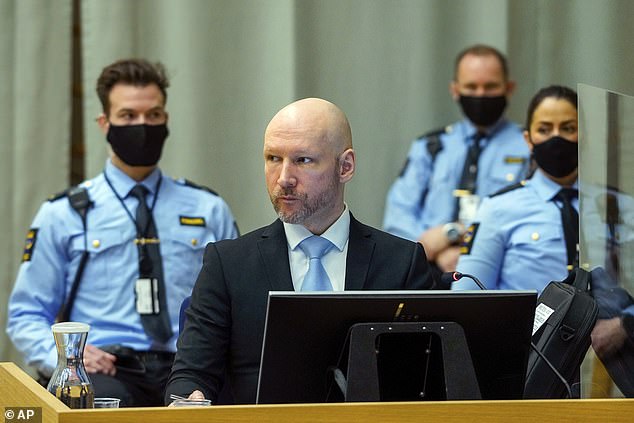
Breivik, 44, has been kept apart from other prisoners at the high-security Ringerike prison near Oslo for more than 11 years and is now “suicidal” and taking the antidepressant Prozac, his lawyer claimed.


The entrance gate to Ringerike Prison where Anders Behring Breivik is serving his custodial sentence in a cell spread over two floors is pictured on December 14 in Tyristrand, northwest of Oslo, Norway
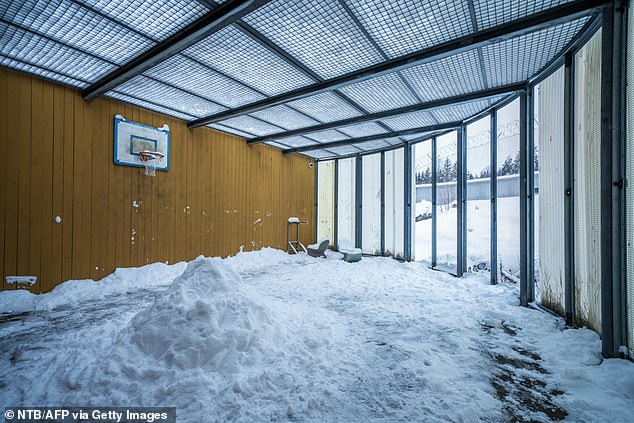

The air yard on the first of two floors of the cell where Anders Behring Breivik is serving his custodial sentence in Ringerike prison is shown
Breivik, who is now suing the Norwegian state for the second time over alleged human rights violations, is expected to appear in court today.
But a judge has decided to prevent his testimony, expected on Tuesday, from being broadcast in the media.
One reason for this is that Breivik has in the past used his public appearances as a platform to express his political ideology and provocations, including Hitler salutes and tirades, which were painful for survivors and relatives of the victims.
“There would be a real danger that Breivik's testimony would distract from the issue at hand and emphasize his ideological message,” judge Birgitte Kolrud said.
Since his conviction in 2012, Breivik has done just that He was “being held in isolation, and the more time passes, the greater the violation of the Convention,” his lawyer Oystein Storrvik said in October.
In the court documents, Storrvik said the “long period of isolation and absence of meaningful interaction has caused Breivik (mental) suffering, including the fact that he is now suicidal.”
“He depends on the antidepressant Prozac to get through his days in prison,” Storrvik said.
According to him, Breivik's only personal contact is with two other prisoners, whom he sees every two weeks for an hour under close supervision, and his interaction with prison staff.
Citing another article of the Convention on Human Rights that guarantees the right to correspondence, Breivik has also called for an easing of restrictions on writing letters with people outside prison.
Breivik has already sued the Norwegian state on both counts, with an Oslo district court stunning the world in 2016 when it ruled that his isolation was a violation of his rights.
On appeal, Norway's higher courts ruled in favor of the state, and the European Court of Human Rights dismissed his case as “inadmissible” in 2018.
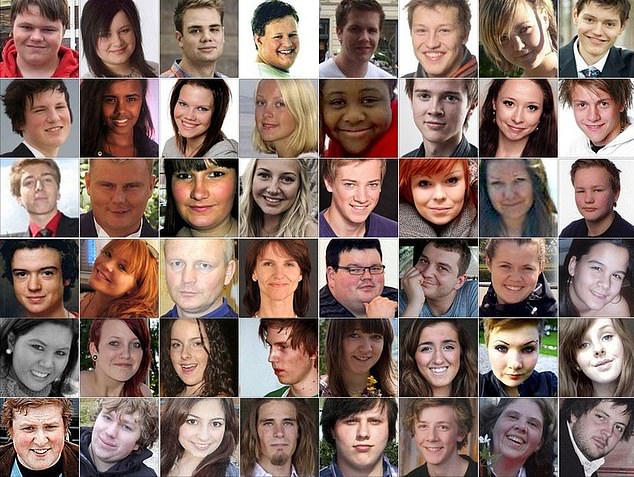

Breivik was sentenced to 21 years in prison, the harshest possible sentence under Norwegian law, for killing 77 people in a bomb attack in July 2011. Pictured: the victims of the terror attack
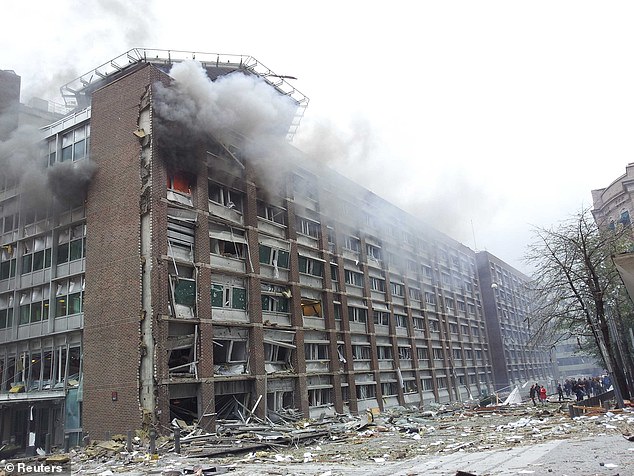

It was July 22, 2011 when Breivik, after months of painstaking preparations, detonated a car bomb outside the government headquarters in Oslo, killing eight people and wounding dozens.


Breivik then drove to the island of Utøya, where he opened fire on the annual summer camp of the youth wing of the left-wing Labor Party. Sixty-nine people were killed there, most of them teenagers, before Breivik surrendered to the police (photo: young people hide as police arrive on the island on July 22, 2011)
The five-day trial that starts on Monday will be held in the gymnasium of the Ringerike prison for security reasons.
The prison is located on the shores of the lake that surrounds Utoya Island.
According to Norwegian news agency NTB, Breivik has access to several rooms on two floors, including a kitchen, a TV room with a games console and a gym.
Prison officials also fulfilled his request for a pet to keep him company by giving him three parakeets, NTB said.
Norway prides itself on a humane prison system that focuses more on rehabilitation than punishment.
Lawyers representing the Justice Ministry say that Breivik's isolation is relative and justified due to the danger he poses, and that his prison conditions are necessary to protect society, other prisoners and guards, but also himself, given the risks from other prisoners.
Breivik enjoys “a wide range of activities” such as cooking, games, walking and basketball, and “there is no indication that he suffers from physical or mental problems due to his prison conditions,” state attorney Andreas Hjetland said.
They said in their court that his isolation was “relative” as he has contacts with guards, a priest, health workers and, until recently, an outside volunteer who no longer wants to see Breivik.
“Breivik has so far shown little interest in rehabilitation work,” he added.
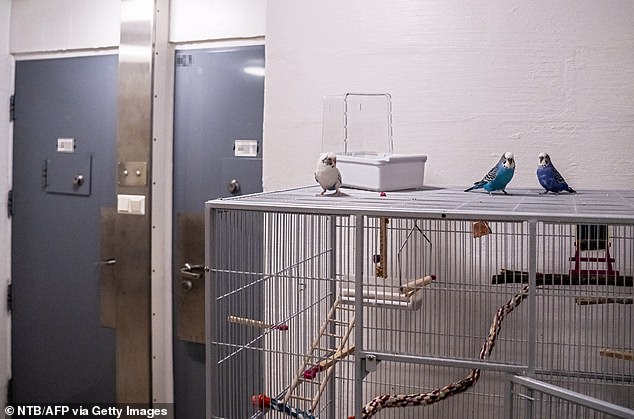

Breivik's cell is spread over two floors. Here is the hallway on the 2nd floor where there is a birdcage with three parakeets
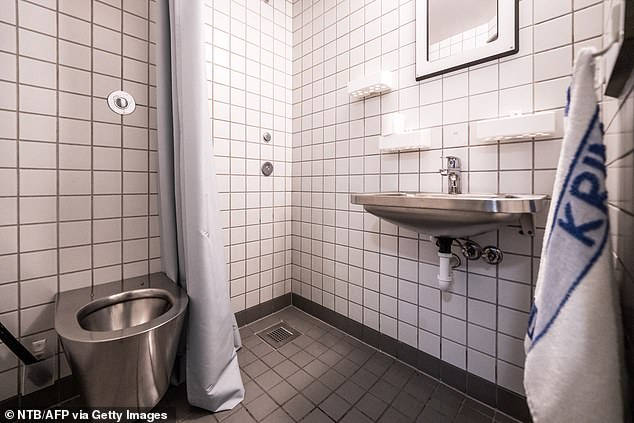

A similar bathroom and toilet of the sleeping cell on the second of two floors where Anders Behring Breivik is serving his custodial sentence in Ringerike prison is shown
'It is therefore difficult to imagine what significant improvements in his prison conditions are possible and justified in the short term.'
Control over Breivik's contacts with the outside world is justified by the risk of causing others to commit violent acts, the lawyers argue.
“In concrete terms, this applies to contacts with extreme right-wing circles, including people who want to make contact with Breivik following the terrorist attacks of July 22, 2011,” they write in the file.
Breivik was cited as an inspiration by Brenton Tarrant, who killed 51 people at two mosques in Christchurch, New Zealand, in 2019.
Breivik is serving a 21-year prison sentence – the longest a Norwegian court can impose – which can be extended as long as he is considered a threat to society.
“What is unique is how long he was in isolation,” said Knut Mellingsaeter Soerensen, an associate professor at the Norwegian Police University and author of a PhD on Breivik's conditions in his first prison from 2011-2013.
'The challenge, with someone who has demonstrated the intent and ability to carry out a terrorist attack and plan it over an extended period of time, is: when do you relax security measures so that you can actually have contact with other prisoners? '
Breivik also sued the state in 2016, arguing it violates the European Convention on Human Rights, including sections that say no one shall be subjected to “torture or to inhuman or degrading treatment or punishment.”
He initially won the case, but it was overturned on appeal a year later before all restrictions were lifted.
